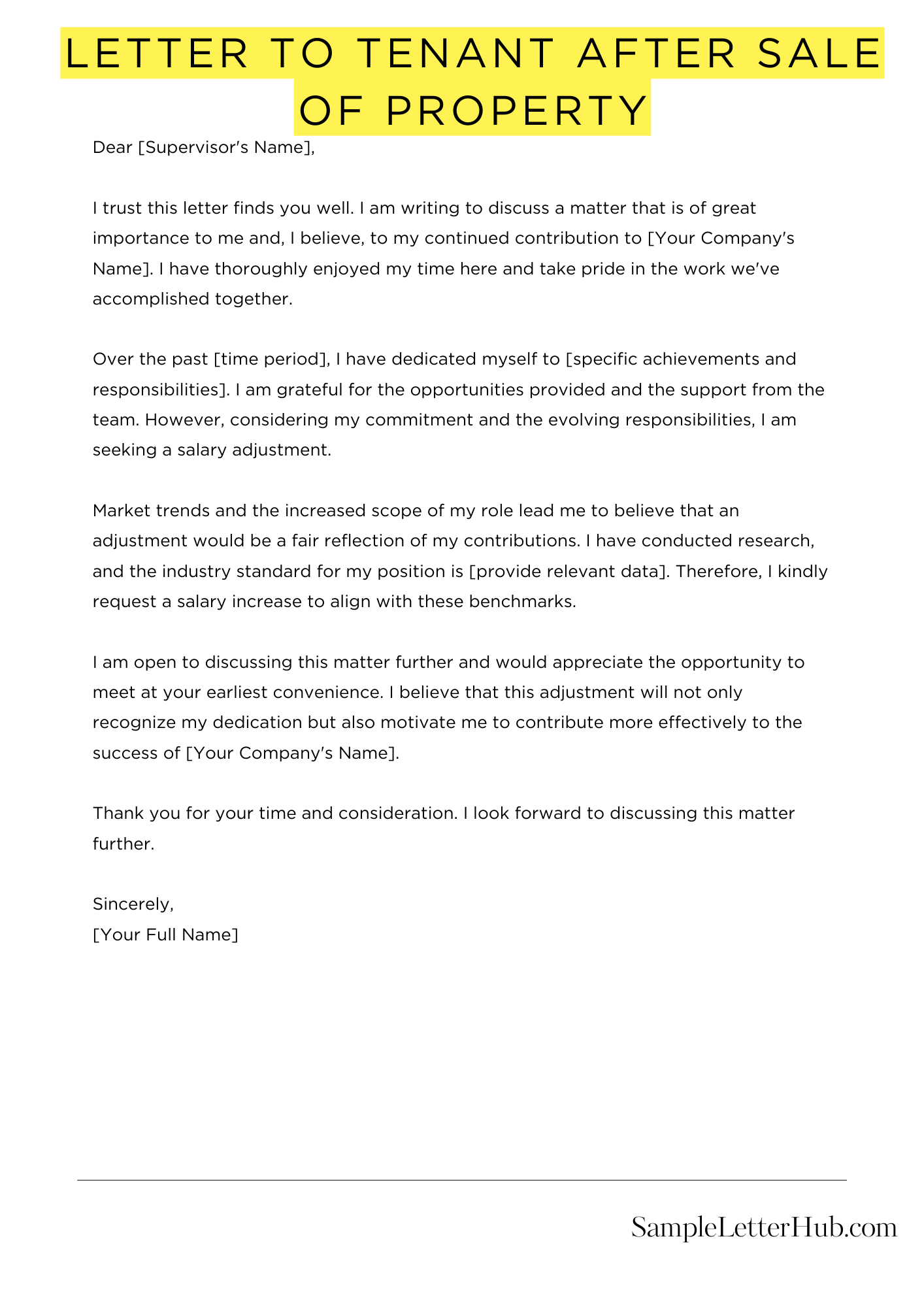A “Letter to Tenant After Sale of Property” is a formal notification sent to a tenant informing them of the sale of the property they are renting. This letter serves to inform the tenant of the change in ownership and any potential implications for their tenancy.
In this blog article, we will provide several templates, examples, and samples of “Letter to Tenant After Sale of Property.” These templates are designed to make it easy for you to draft a professional and informative letter to your tenant, ensuring that they are properly notified of the sale and any necessary arrangements.
By providing these samples, we aim to simplify the process of writing a “Letter to Tenant After Sale of Property” and ensure that you have all the necessary information to effectively communicate the change in ownership to your tenant.
Letter to Tenant After Sale of Property
Dear [Tenant’s Name],
I am writing to inform you that the property you are currently renting at [Property Address] has been sold. The new owner will take possession of the property on [Date].
I understand that this may be unexpected news, and I want to assure you that I will do everything I can to make this transition as smooth as possible.
The new owner has agreed to honor the terms of your current lease agreement. This means that your rent, security deposit, and lease end date will remain the same.
However, there may be some changes to the property management company or contact information. I will provide you with the new contact information as soon as it is available.
I would like to schedule a time to meet with you to discuss the sale and answer any questions you may have. Please let me know what time works best for you.
In the meantime, please do not hesitate to contact me if you have any concerns.
Thank you for your understanding and cooperation.
Sincerely,
[Your Name]

How to Write Letter To Tenant After Sale Of Property
When you sell a property that is occupied by a tenant, you need to notify the tenant of the sale and provide them with information about their rights and responsibilities.
What to Include in the Letter
The letter should include the following information:
- The date of the sale
- The name and contact information of the new owner
- A statement that the tenant’s lease will remain in effect with the new owner
- Any changes to the lease terms that will be effective with the new owner
- The date that the tenant’s rent is due to the new owner
- The contact information for the new owner if the tenant has any questions
How to Write the Letter
The letter should be written in a clear and concise manner. It should be easy for the tenant to understand and should not contain any legal jargon. You should also be sure to proofread the letter carefully before sending it to the tenant.
When to Send the Letter
The letter should be sent to the tenant as soon as possible after the sale of the property. This will give the tenant time to adjust to the change in ownership and to make any necessary arrangements.
What to Do if the Tenant Does Not Respond
If the tenant does not respond to the letter, you should try to contact them by phone or email. If you are still unable to reach the tenant, you may need to send them a certified letter.
Additional Tips
Here are some additional tips for writing a letter to a tenant after the sale of a property:
- Be polite and respectful
- Be clear and concise
- Proofread the letter carefully before sending it
- Send the letter as soon as possible after the sale of the property
By following these tips, you can ensure that your letter to the tenant is effective and informative.
FAQs about Letter To Tenant After Sale Of Property
What should be included in a letter to a tenant after the sale of a property?
The letter should include the following information:
- The date of the sale
- The name of the new owner
- The new owner’s contact information
- The date the new owner will take possession of the property
- Any changes to the lease agreement
When should the letter be sent to the tenant?
The letter should be sent to the tenant as soon as possible after the sale of the property. This will give the tenant time to make arrangements to move out or to contact the new owner to discuss the terms of the lease.
What if the tenant does not want to move out?
If the tenant does not want to move out, the new owner will need to evict the tenant. The eviction process can be lengthy and expensive, so it is important to try to resolve the issue with the tenant before resorting to eviction.
What if the tenant has a lease that extends beyond the date of the sale?
If the tenant has a lease that extends beyond the date of the sale, the new owner will be bound by the terms of the lease. This means that the new owner will have to honor the lease until it expires.
What if the tenant has not been paying rent?
If the tenant has not been paying rent, the new owner can take legal action to evict the tenant. The new owner can also file a claim against the previous owner for any unpaid rent.

